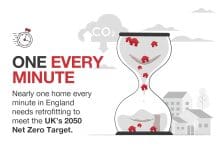Tarmac has signed a charter produced by The Pallet LOOP, which aims to reduce pallet waste in the construction industry
Annually, around 18 million pallets are estimated to be used in the UK construction sector, but only 10% are reused.
The Pallet LOOP scheme aids in reducing pallet waste by allowing manufacturers to pay a deposit for distinctively-branded 100% FSC-certified green pallets, which are used to transport products to construction sites and have been specifically engineered to be more durable and sustainable.
As LOOP pallets move through the supply chain, a deposit passes from manufacturer to merchant to end user. Once used, stacked and stored, the scheme operator collects the pallets and returns deposits, before repairing pallets as necessary and recirculating them.

‘Helping to reduce construction waste by transforming the way in which pallets are used’
Garry Gregory, packed products director at Tarmac, commented: “We’re committed to working towards achieving a circular economy and our approach to this starts with designing out waste wherever we possibly can across our operations.
“The Pallet LOOP is a positive and effective initiative which is already helping to reduce construction waste by transforming the way in which pallets are used – and turning them into valuable returnable assets. We’re pleased to have signed up and would encourage others from across the construction industry to do the same.”
‘Delivering significant cost savings and efficiencies’
Paul Lewis, founder of The Pallet LOOP, said: “We are delighted that Tarmac has signed our charter and committed to a comprehensive evaluation of how our circular economy pallet reuse scheme could work across its operations.
“The beauty of the LOOP model lies in its simplicity. While helping the construction sector achieve its net zero and zero avoidable waste targets, The Pallet LOOP will also deliver significant cost savings and efficiencies to the end-to-end building materials supply chain.
We’ve already sent sample pallets over to Tarmac for testing and look forward to working with the team over the coming months to explore their distribution requirements and the clear advantages to be gained from moving away from single-use pallets.”














